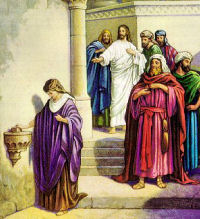Ordinary Time: November 11th
Thirty-Second Sunday of Ordinary Time
» Enjoy our Liturgical Seasons series of e-books!
Old Calendar: Twenty-Fifth Sunday after Pentecost
He sat down opposite the treasury and observed how the crowd put money into the treasury. Many rich people put in large sums. A poor widow also came and put in two small coins worth a few cents. Calling his disciples to himself, he said to them, "Amen, I say to you, this poor widow put in more than all the other contributors to the treasury. For they have all contributed from their surplus wealth, but she, from her poverty, has contributed all she had, her whole livelihood (Mark 12:41-44)."
The feast of St. Martin of Tours, which is ordinarily celebrated today, is superseded by the Sunday liturgy.
Click here for commentary on the readings in the Extraordinary Form of the Roman Rite.
Sunday Readings
The first reading is taken from the First Book of Kings 17:10-16.In this reading we have one of the many miracles attributed to Elijah, the great prophet who preached in the northern kingdom between 900 and 850 BC.
The second reading is from St. Paul's Epistle to the Hebrews 9:24-28. This epistle continues with its description of Christ as the high priest of the New Testament and his superiority over those of the Old Testament.
The Gospel is from the Gospel of St. Mark 12:38-44. Our Lord's severe condemnation of those Scribes whose exaggerated opinion of their own importance made a mockery of the religion they professed to live, is a serious warning to all his followers not to look for the praise and esteem of their neighbors when doing their good works, but rather to hope for God's praise and esteem in the future world. In another context, he said to his followers: "Because of practicing your piety before men in order to be seen by them, for then you will have no reward from your Father who is in heaven . . . when you give alms do not let your left hand know what your right is doing ... and your Father who sees in secret will reward you .. . when you pray go into your room and shut the door and pray to your Father ... who sees in secret and will reward you" (Mt. 6: 1-6).
It is hardly necessary to say that our Lord is not referring to community prayers or services here. What he is condemning is the hypocrisy of the Scribes, who lengthened their garments and their prayers not in order to give glory to God but to earn the glory of their fellowmen for themselves. Pride was their predominant vice—the vice which caused the fall of angels and of man. It so governed their lives that even their best actions were vitiated by it. There is a strong inclination to pride in every one of us. The reason is that we have great gifts from God and great capabilities: but we are tempted to claim the credit for these gifts and capabilities for ourselves—whereas we owe them all to God's generosity.
A proud Christian is surely a contradiction in terms. A Christian is a follower of Christ whose humility can never be equaled. He was God as well as man. While on earth he emptied himself, as St. Paul puts it, of his divine glory so that he could be like one of us. A follower of Christ should not try to make display of gifts which are not his own, nor try to exalt himself above his neighbor because of something he has which was not given to his neighbor. If Christ wanted to be, and indeed was like the least one among us, we must never try to raise ourselves above our neighbor. Love of neighbor is the second of the two essential commandments—there can be no true love of neighbor where there is pride.
The second incident in today's Gospel story highlights true humility and true charity. The poor widow, forgetful of herself and of her own needs gave her all, her last penny, to help others who were in need. She made this sacrifice without publicity and without seeking the praise of her neighbors. It is this deep contrast between her outlook on life and on religion, and that of the Scribes in the first that connects the two incidents. While the Scribes sought to earn the respect and praise of their fellow-Jews—as well as all the financial gain they could come by—from the practice of the externals of their religion, this poor widow's religion was practiced in secret and it was to God alone that she looked for any reward that he might deign to give her.
As we saw in today's first reading we can be sure that she was not left without the reward she deserved. The widow of Zarephath was given a temporal reward. The same generous God did not let the similar act of supreme generosity on the part of the widow in Jerusalem go unnoticed. Christ's judgment on the Scribes implies this: They will receive the greater condemnation for their pride, and abuse of religion for their own temporal gain. On the other hand the widow's religion was an act of complete self-renunciation: "she has put in everything she had, her whole living."
We may never be called on to share our last morsel with a starving neighbor but if we are, we must remember that Christ gave his very life for us and has asked us to do likewise, if necessary. It may never be necessary for us to make this supreme act of self-renunciation. If, however, we are sincerely practicing our religion, we must be ever-ready to help a neighbor in need even if this cuts into our hard-earned reserves. The greater the sacrifice, the greater the reward.
Excerpted from The Sunday Readings by Fr. Kevin O'Sullivan, O.F.M.
